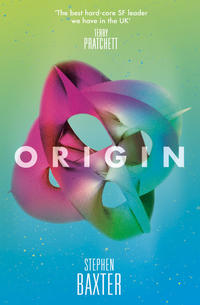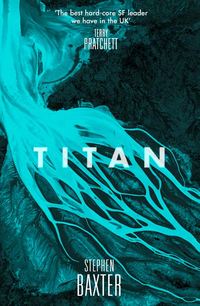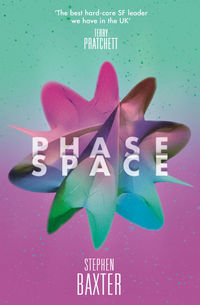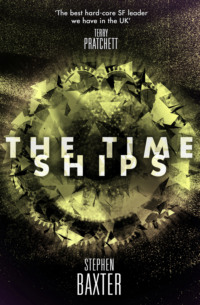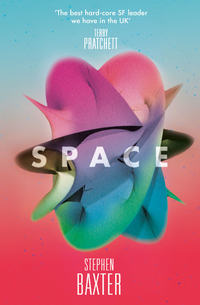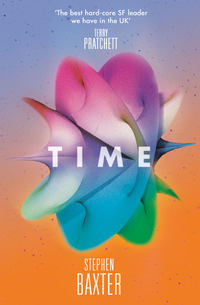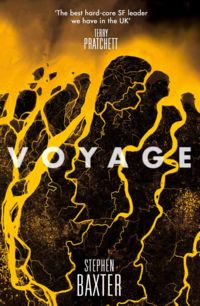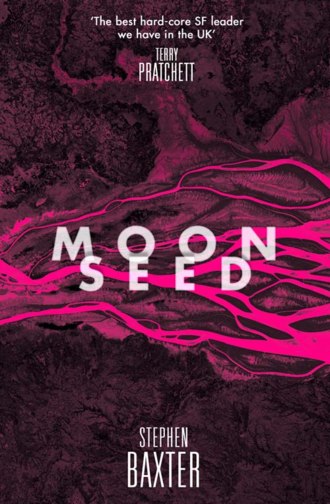
Полная версия
Moonseed
After that, they got tougher.
Your husband thinks there’s an ocean on the Moon, doesn’t he?
Gentle laughter.
‘Not an ocean.’
But enough to flood the Moon, if it was all melted. Is that right?
‘It’s a possibility.’ She smiled tightly. ‘I don’t pretend to understand the theory of how it got there. But it seems possible.’
Geena, do you think NASA should have brought the astronauts home from Station?
‘No. The evidence we have is that the radiation pulse from Venus was transient. The danger’s already over …’
Geena, I can’t help notice Dr Meacher isn’t here.
Sixt tried to help out. ‘Nor are my ex-wives. Attendance isn’t compulsory, thank God.’
That got a laugh. But the questioner, a journalist, was persistent. You didn’t back his Shoemaker proposal. We hear he’s leaving NASA over it. Is there any bitterness between you?
She was aware of a shift in the body language of the crew up here on the stage, the managers, the rest of the audience. Everyone was quietly waiting for her answer, as always fascinated by some other poor sap’s domestic difficulties.
‘There’s no bitterness. Henry and I have our separate careers. Even when we were married, that was so. And now our marriage is over, but the break-up had nothing to do with our differences over Agency policy. I hope that answers you.’
It was, at least, enough to shut him up. But she knew – and everybody else in the room seemed to know – that it wasn’t the truth.
The briefing broke up, and they were led out to an autograph session.
Later in the day, on impulse, she phoned Henry, at his hotel in Edinburgh.
‘I’ll help you,’ she said.
What? How?
‘I’ll find out the context. Of your rock.’
He paused. She thought he was gathering his strength, as if he was about to come back with another put-down. But then he said, tenderly, You do that.
Tenderly. But, she saw clearly, without love.
7
Mike Dundas picked Henry up from the Balmoral.
It was a balmy Saturday evening, at the end of Henry’s first full week in Edinburgh, and Mike had asked Henry over for dinner. Henry had accepted uneasily. He still didn’t feel much like being sociable; and besides, he wondered what horrors of northern British cuisine he was going to be subjected to.
But he couldn’t see any way out of it, with grace. Mike seemed pathetically grateful to Henry for giving him the chance to work on the Moon rock. Maybe this would let the kid get that out of his system.
They drove south for a mile or so, and arrived at a small estate of identikit houses. Mike pulled up in front of one house, maybe 1960s vintage: a nondescript box, a small garden to front and back, like, Henry sensed, millions of similar suburban homes all over Britain. A little further away there were rows of tower blocks, the result of some misconceived housing policy of the recent past. Not a great place to live.
But it was redeemed by one hell of a view of Arthur’s Seat, to the east.
This was actually his father’s house, Mike said; his mother died a few years before.
‘So who’s cooking?’
‘Dad. With a little help from me.’
‘Oh, shit.’
Mike laughed, and locked the car.
A plastic soccer ball hit Henry in the nose.
A kid came running around the side of the house: a boy maybe ten years old, all stringy muscle and energy, his elbows and ankles sticking out of his clothes. ‘Oh, bugger,’ he said.
Mike said, ‘Jack!’
‘Mister, I’m sorry.’
Henry had to stand there and wait while the blow’s effects worked their way along his nervous system, and when it reached his pain centre the agony was disproportionately huge.
Holding his nose, he waved his free hand. ‘Forget about it.’
The kid retrieved his ball and ran off out of sight.
‘Who the hell was that?’
‘Jack. My nephew. Come on, I think you deserve a beer.’
‘Damn right.’
They walked into the house. Mike called ahead, and an older man came out of the back, wearing a plastic apron with a picture of a French maid’s torso on it. The apron had to stretch over the guy’s beer belly. He stuck out his hand. ‘Ted Dundas. Mike’s father.’ His accent was different to Mike’s, stronger almost to the point of incomprehensibility, with half the consonants missing and every vowel distorted. He was, Mike had told him, an ex-cop.
‘Thanks for inviting me.’
Ted waved a hand. ‘Help yourself to a beer.’ He went back to the kitchen.
Mike followed, and returned with two pewter tankards, unopened cans of beer inside them. It was the cold light ale the Brits called lager.
They wandered through the house. It was minimally furnished, a big colour TV in the living room, a sliding glass door that gave onto a brick patio, walls painted in pastel whites, a lot of brickwork throughout the house.
Henry wondered what to say. ‘Tasteful.’
Mike laughed. ‘You don’t fool me. But thanks for trying.’
They went out through the open patio doors to the small garden. It was east-facing, Henry saw, so it was in the shadow of the house in the evenings; but it had a good view of Arthur’s Seat. Henry took a couple of breaths. The evening air was fresh and cold.
They were close to the western face of the Seat here; the Salisbury Crags loomed a half-mile or so to the east, their rust-brown faces glowing with colour in the low sun.
‘Oh. It’s you.’ A familiar woman’s voice.
Henry turned.
It was the sister, Jane, who he had met in that disastrous encounter in her shop. She was wearing a long floral-patterned dress, open at the neck, some kind of wooden clogs, and a hair band. She was standing there holding a glass of wine, the low sun on her face. She wasn’t wearing the peridot necklace, Henry realized with vague, unreasonable disappointment.
Mike stepped forward, grinning. ‘Jane, meet Henry Meacher. My colleague at –’
‘You bastard,’ she said to Mike. ‘You knew.’ She turned on Henry. ‘So did you, in the damn shop. Big joke, guys.’
Henry spread his hands. ‘Believe me, I wasn’t expecting you.’
‘Or you wouldn’t have come. Right?’
‘No. I mean, yes.’ He drained his beer. ‘Mike, could I get another one of those?’
But Jane had turned on Mike. ‘As for you, you little shit –’
Mike’s grin didn’t fade. ‘Hello, Jack.’
Here came the kid, his soccer ball moving at his feet as if stuck there with glue.
‘Kid’s got a good shot on him,’ Henry said drily.
‘You like kids?’
‘I loathe the little assholes.’
Jack laughed, and got himself a glare from Jane.
Mike touched Henry’s shoulder. ‘Keep that up and you’ll have a friend for life.’
Mike’s father stuck his head out the door. ‘Snouts to the trough!’
The five of them sat around a table of some polished wood. It might even have been mahogany. But the setting wasn’t too formal – plates and cutlery that didn’t match, paper napkins, the table scattered with sauces and condiments and wine and beer, and a Diet Coke for the kid. The body language of the adults made it clear the soda was some kind of special treat.
Out of his apron, the father, Ted, revealed a shirt and tie. In the middle of the table Ted put out a steaming bowl of what looked like chili, some kind of minced meat with tomatoes, kidney beans, big chunks of onion; there was a choice of tortilla chips or rice. Henry took the chips, some fresh bread, and a couple of healthy ladle-fuls of the chili. He tried a mouthful; it was hot and sharp.
‘I’m impressed,’ he said.
Jane eyed him. ‘You were expecting haggis and kilts.’
‘No. I didn’t think you British were eating beef.’
‘Not beef,’ the father said through a mouthful of chili. ‘It’s quorn. Meat substitute.’ He slapped his belly. ‘Better for you. I’d generally serve up salad but what with all this radiation you can’t get fresh vegetables for love or money –’
Henry sneezed, suddenly. Then sneezed again.
Ted stared. ‘What’s wrong with him?’
Jane said, ‘Serves him right for walking around Edinburgh in a T-shirt.’
‘I get allergic.’ He looked around. ‘You got a cat?’
‘Yes,’ Ted said. ‘Willis. The little beastie isn’t here right now.’
‘Randy little sod,’ Jane said mildly, eyeing her father. ‘Like his owner.’
‘Don’t speak about your father like that,’ said Ted.
‘Doesn’t matter if the cat’s here or not,’ Henry said. Sneeze. ‘One hair is enough.’ Sneeze. ‘Do you have any anti-histamines?’
Ted eyed him. ‘Do I look as if I have any anti-histamines?’
The boy was staring at him. ‘Do you like cats?’
‘No. I loathe cats.’
‘I thought you loathed kids.’
‘I loathe kids and cats. I’m big on loathing. I have a dog, called Rocky. I had to find him a foster home when –’
‘Are cats little assholes too?’
Jane went into glaring-parent mode, but the father was guffawing, and the moment passed.
‘So,’ Ted said. ‘You like Edinburgh?’
Henry thought over his answer. ‘I guess,’ he said. ‘I’m not a city guy. But it has a comfortable scale. It reminds me of Prague.’
Jane laughed. ‘Prague?’
‘Why not Prague?’
‘Just remember,’ Ted said. ‘Edinburgh is all fur coat and no knickers.’
The kid giggled, and Jane said, ‘For God’s sake, Dad.’
‘Well, it’s true.’
Mike leaned to Henry. ‘He’s from Glasgow.’
Now the kid spoke to Henry. ‘So you’re a geologist too, like Uncle Mike.’
‘Yeah. You want to be a geologist when you grow up?’
The kid gave him a pitying look. Jane looked amused.
Henry ploughed on.
‘When I was a kid I wanted to be an astronomer. I used to hang out at weekends at the Griffiths Observatory, above Los Angeles, when my buddies were down on the beach. I even made a map of the Moon, when I was fifteen or so. But real-world astronomy wasn’t for me. I think it was because nobody looks through a telescope any more. I missed the tactile stuff.’ He hesitated. ‘I liked the feel of starlight, light that was a thousand years old, tickling my eye.’
Jane cocked an eyebrow.
‘And if that’s too poetic for you –’
‘Poetry’s fine,’ she said. ‘Just don’t make a habit of it.’
‘Anyhow, I turned to geology. The world is full of rocks you can touch, after all. I majored in geology at Pomona, in Southern California, and UCLA at Berkeley and LA. At UCLA I learned to live like a geologist, which is to say,’ he said to Jack, ‘in the middle of messy oil fields and mines and heat, or cold, and rattlesnakes and poison oak and cow pies …’
The kid’s eyes were pleasingly round. ‘Do you get to see volcanoes?’
Henry said, ‘Not much. I have friends who do that. What I mostly study is the Moon. Do you know about the Moon?’
‘Some.’
‘During the grind at UCLA I visited JPL – the Jet Propulsion Laboratory, where they run the space probes out of, and I saw the pictures of the Moon they had there, and it was like being a kid again. So there I was. I wanted to be a geologist, working with Moon rocks. But only one geologist ever flew to the Moon, and that was thirty years ago, and there was no prospect of anybody going back soon.
‘Anyhow after that I was a little stuck. I wasn’t interested in the oil companies which hire most geologists. I decided I had to bite the bullet. I had to go work for the only place specializing in Moon rocks, thirty-year-old collection or not, and that is the Lunar and Planetary Institute in Houston. NASA.’
‘NASA,’ breathed Jack.
‘It’s not as cool as you might think. What I found when I got there was they were throwing out half their collection of Lunar Orbiter and Apollo photographs, maps and mission documents. You wouldn’t believe it. I had to pull them out of the dumpster, literally, forty billion dollars’ worth of trash. NASA is much better at gathering data than storing it …’
Jack looked baffled.
Jane said, ‘You don’t talk to kids much, do you?’
‘I know about the craters on the Moon,’ Jack said. ‘Like Tycho.’
‘Well, that’s good.’
‘Are the craters volcanoes?’
‘No. The craters are impact scars. But we used to think they were volcanic. You know, they took the Apollo astronauts crawling over Hawaii for their training, the big volcanic calderas there. All those lava surfaces. They thought the Moon would be like that. Wrong … They should have stayed on the beaches; that turned out to be a closer match. Anyway I hate Hawaii.’
‘Why?’
‘I was once studying active lava flows there, and I broke through a solid crust and sank into molten lava up to my knees. Not pleasant. But I recovered.’
‘Wow,’ said the kid, round-eyed. ‘Is lava dangerous?’
‘No. Lava is friendly. Unless you’re unlucky, or careless, like I was. You can walk around on lava. It smells odd, like scorching paper. And it moves slowly; you can get away from it. Pyroclastic flows are what you have to look out for if you’re ever close to a volcano.’
‘Pyro –’
‘Ash.’
Ted helped himself to more chili. ‘So why do all geologists look like they’ve been living in a hole in the ground?’
Jane laughed.
Mike said, ‘They probably have, dad.’
Henry said, ‘It’s true. There are other types of people who study the Earth. Like photogeologists, for instance, who work from photographs, and petrologists, who treat their rocks like lab specimens, and geochemists and geophysicists. But old-time geologists will look down their noses at any of that and say, “Needs field checking”. By which they mean, if you can’t walk on it and rub your hands in it and get yourself good and dirty in it, it ain’t geology.’
‘Hey,’ Mike said. ‘I have a joke about that. Maybe you heard it. What’s 2 plus 2? The geologist says, “Well, around 4.” The geochemist says, “4 plus or minus 2.” The geophysicist says, “What number do you want?”’
Henry laughed, though he’d heard it before. The others just looked baffled.
‘So,’ said the father. ‘You divorced, separated or what?’
After the meal, Mike’s father said he would wash up, and Mike and Jack went out to the garden to play some more football.
Jane and Henry sat in the living room, regarding each other warily.
Jane said unexpectedly, ‘You want to go for a walk?’ She stood briskly. ‘We’ll climb the Seat. Shouldn’t take more than an hour. Unless you think that’s too far.’
Henry stood. ‘I’ll be fine.’
She handed Henry a heavy radiation-screen poncho, and marched him out the door and down the path.
They tramped for a brisk half-mile on the road, going north-east, skirting the base of the Seat. Then they turned off and began to climb a path over the Seat itself. Soon, Henry was walking over spongy grass, with hard basalt beneath, tough through the soles of his training shoes.
The noise of the traffic diminished, and the only sounds were their breathing, growing deeper as they walked, and the soft susurrus of the wind in the grass. As the fresh air filled his lungs, even his sneezing diminished.
It was cold, however, despite the poncho, but, after nearly two weeks in Scotland, he wasn’t about to admit that.
They turned west again, and followed a path Jane called the Radical Road, which ran at the foot of a low crag. She said, ‘This is the north end of Salisbury Crag.’
He stepped forward and ran his fingers over the exposed rock. ‘It’s a sill,’ he said. ‘A sheet of basalt.’
‘I know.’
‘Geologists like basalts,’ he murmured. ‘They’re what you get when planets melt. And they tell you a lot about hidden processes …’ He ran his hands over the other layers. ‘Looks like baked shale above it. Maybe cementstone. And below, this is sandstone –’
‘I know that too. This is what’s left of the Old Red Sandstone Continent.’
‘You’re a smart cookie.’
They walked on, along the base of the crag.
At length she said, ‘I don’t know if I like being called a “cookie”.’
‘You’re very competitive, aren’t you?’
‘And you’re not too good with people.’
He made to deny it, or to come back with a snappy answer. But he shrugged. ‘Maybe not. You know, when I was doing my doctoral research I spent eighteen months in Norway, clambering around the fjords there. A lot of that time I spent alone. Working alone in tough terrain like that is something most geologists would frown on, but you do it anyway, when you are short on time or you’re too poor to pay for a field assistant. As I was.
‘So I climbed over the ice rivers, trekked past sheer rock walls, trying to make the most out of the money it had cost me to go there. Oh, I knew my limits; I saved the really tough country for those times when I was accompanied. But I wasn’t afraid of being out on a limb. Relying on myself.’
‘And,’ she said drily, ‘your point?’
‘Well, when I look back on it that was one of the happiest times of my life. Because it was the simplest. People just –’
‘Make things complicated?’
‘Something like that.’
‘You never answered Dad’s question.’
‘Divorced,’ he said. ‘Just.’
‘Jack’s father left when he was still small. He doesn’t remember him.’
‘You don’t need to tell me.’
‘I want to tell you. Jack was a glue baby, if I’m honest. You know what that means?’
‘I guess.’
‘So, good riddance.’
‘Right …’
He liked the way the deepening light caught the planes of her face. It seemed to emphasize the strength and intelligence there.
He sneezed violently.
They walked on for a time. The path ascended and descended, a gentle switchback, as the lava sill waxed and waned in thickness.
At the end of the sill, they clambered up a steep, eroded path towards the summit of Arthur’s Seat.
At the summit, they sat on broad, worn-smooth patches of ancient agglomerate. Henry found the backs of his legs were aching pleasurably; he hadn’t been getting enough exercise, he realized.
They looked to north and west, over the city. A blue mist, sharply defined, lay across the land. The spires and towers of the city poked out of the mist. A waning Moon, thin and attenuated, hung in the sky.
‘The old folk call the mist the haars,’ Jane said.
‘It’s beautiful.’
‘On a clear day you can see a long way. All the way across the Midland Valley graben from the Highlands, fifty miles or so to the north, and down to the Southern Uplands, ten miles south-east of here, beyond the coal field –’
‘I’m impressed.’
‘By the view?’
‘By the fact that you know terms like graben.’
‘You’re such a patronizing arsehole.’ But this time her tone was so mild it almost sounded affectionate.
‘Thank you,’ he said. ‘So what about you? How did you get into, uh, rocks?’
‘And all the other cookie-girl New Age stuff, you mean?’
‘I didn’t say that.’
She pulled at a tuft of grass. ‘Actually, it was the Moon.’
‘The Moon?’
‘I read a science fiction story which shocked me. I was only ten or so – about Jack’s age, I guess.’
‘What story?’
‘I don’t remember the title. I think it was a Heinlein. The point was, he suggested the Moon is the way it is because of a nuclear war up there. It blasted off the atmosphere, and boiled the oceans, and killed everybody.’
He nodded. ‘And Tycho was just the biggest arms dump.’
‘You know it. You don’t need to tell me it makes no sense.’
‘I wasn’t going to.’
‘It scared me to death. As I got older I started to read about all the perils we faced – still do face. Before I left school I was organizing recycling drives. I read politics and economics at university. I got into real politics later, mainly with the Greens. Not that I ever got elected anywhere. But that doesn’t pay the bills –’
‘Hence the rock shop.’
‘Yeah.’
‘So,’ he said. ‘You’re what we’d call a survivalist? You think that when it all falls apart we should pack up and head for the hills?’
‘No.’ Now she did sound offended. ‘Of course not. We’re human beings. We got where we are by cooperating, by helping each other. It’s just that the future is so dangerous.’
‘Yep.’
‘We’re going to have to be smart to survive, on any timescale you care to think about. My dad says he thinks I went a little crazy, back when I was a kid. But I think I went a little sane. It was like waking up. It seems to me that everyone else is a little crazy, not me.’ She was looking out over the city, and the last of the sunlight picked out her profile, her strong nose and chin.
He said, ‘Maybe you’re too sane. Nobody should be burdened with too much future.’
‘I’m not so tough. I’m a twentieth-century baby like everybody else. Spoiled rotten. As soon as anything serious happened, I’d run round in circles.’
‘I wouldn’t be so sure.’
The light was diminishing. The Moon grew brighter, as if to compensate, and she looked up at it.
‘You know,’ Henry said, ‘the project I was working on for NASA was about going back to the Moon. Looking for water ice there. I think it’s possible there is so much ice you could actually terraform the Moon.’
‘Make it like the Earth.’
‘Yes. Somewhere else for people to live. But my project got canned, and we may never know about the ice. Nobody’s going to the Moon any time soon. Least of all me.’
‘Would you go if you had the chance?’
He grinned. ‘In those ropy World War Two rockets they fly? No, sir.’
‘So you’re a childless man who wants to build a new world.’
‘Oh. Sublimation, you think.’
‘Could be.’
‘And you’re a parlour psychoanalyst. Lucky me.’
She said, ‘You know, after I read that Heinlein story, I coloured in maps of the Moon, figuring out where the oceans and cities must once have been.’
He nodded. ‘How about that. So did I. We have something in common after all.’
‘I was just a kid …’
He stared up at the Moon. ‘It would be a beautiful thing. A terraformed Moon. It would be much brighter. A twin of the Earth. And if you were on the Moon – well, with that low gravity, it would be like something out of H.G. Wells. The First Men In The Moon.’
‘Umm.’ She stood up, and brushed down her dress. ‘And people call me crazy.’
‘I never did.’
‘But you thought it. I know why. I run a shop where people come and pick up the rocks, trying to feel their vibrations –’
‘Now they’re the crazy ones.’
‘Are they?’ she said mildly. ‘But there’s a rock in my digital watch; its vibrations keep the time. And they vibrate rocks to send laser beams, all the way to the Moon. We live in a strange world. Come on. We’d better go down before it’s too dark. Although you’ll like the Northern Lights displays we’ve been getting since Venus …’
He unfolded his legs and stood.
She led him down a different track, a path that would lead through a glacial cwm and then to a ruined chapel.
‘So,’ he said. ‘What about dinner?’
She frowned, but she didn’t immediately say no. ‘We just ate dinner.’
‘Hell, you know what I mean. What about the weekend? I – woah.’ He stopped in his tracks.
She slowed beside him. ‘What’s wrong?’
‘What is that?’ He pointed ahead.
It was a patch, on the exposed shoulder of the summit agglomerate, roughly circular. It had been hidden from where they had sat. It was, Henry estimated, two yards across. Its surface was metallic silver, flat as steel. At first it looked like some liquid – there was even a fuzzy reflection of the Moon – but he could see it was too sluggish, even for the scummiest pond.


